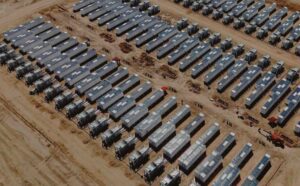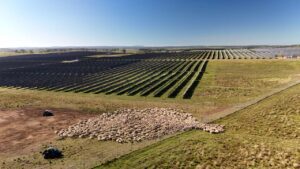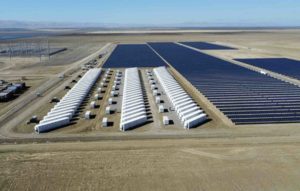AGL Energy is teaming up with Australian Farming Services to develop three bespoke renewable energy microgrids to shift major almond growing operations in the New South Wales Riverina region to cheaper, cleaner power.
AGL, one of Australia’s big three gen-tailers, will build, own and operate the solar and battery based microgrids for the businesses, including two almond orchards, with the aim of slashing their reliance on costly and polluting diesel fuel by up to 85 per cent.
AGL says the two orchards, which are not connected to the local electricity network, currently rely on 100 per cent diesel generation to power their irrigation systems.
Works have begun on the first of the three microgrids at the AFS managed Cadell Orchards, including a 4.9MW solar farm with tracking and a 5.4MWh battery.
The microgrid will supply Cadell’s electricity via a long-term power purchase agreement with AGL, cutting its diesel use down to just 15 per cent and delivering up to 40 percent of energy cost savings each year, while also slashing emissions at the orchard.
At the Canally Almond Orchard, also managed by AFS, AGL will build a 6.5MW solar plant and a 5.1MWh battery storage system, adding underground powerlines to connect the system with the orchard’s irrigation pumping stations.
Like Cadell, the Canally microgrid is expected to deliver an 85 per cent reduction in diesel usage and a reduction of 7,000 tonnes in Canally’s Scope 1 annual CO2 emissions over the 20-year tenure of the power purchase
agreement.
For this project, AGL says it will also explore using the excess solar energy to power agricultural vehicles and trucks transporting the almonds to be processed.
The third microgrid, currently in the feasibility stage, would aim to power AFS’ Murray Downs Processing Plant
site from the lowest cost mix of available grid energy, solar energy and diesel, minimising the use of the latter fuel and helping the plant to operate through any grid outages.
AGL says the processing plant microgrid will also be designed to provide grid stability services to the local network, boosting reliability of supply in the Murray Downs region. Results of the feasibility study will be complete by the end of the year.
“AGL has been working with AFS to model energy usage and to design an integrated and innovative renewable energy system to lower their costs and meet their future need,” said Jo Egan, AGL chief customer officer.
“Our partnership is testament to the great work we are doing in partnering with businesses to provide tailored energy solutions and support our customers to decarbonise the way they live, move and work.”
AFS CEO David Armstrong says the new microgrids will help transform its farming operations, which include more than 4,400 hectares and nearly 1.5 million trees in some of Australia’s most productive horticultural regions.
“As one of the largest employers in the region, these renewable energy projects provide our businesses with greater energy price certainty and better energy reliability so we can focus on producing Australian-grown almonds,” Armstrong said.
“We are working closely with AGL as they design, build and operate the solar-powered microgrid(s) … and deliver the almond farms an 85 per cent reduction in diesel fuel, slashing our emissions and providing substantial cost savings each year.”










